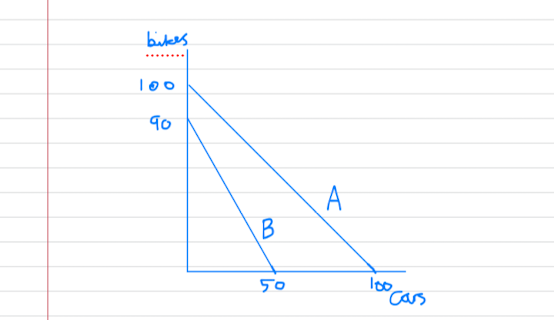Benefits of Free Trade | A-Level Economics Model Essay
One benefit of free trade is that it should cause total world output to increase. Free trade is the act of trading without protecionist barriers. Comparative advantage theory states that if each country specialises in producing the good or service which it has a comparative advantage in, then total world output will always increase. The theory can be described by using a model of two countries producing two goods (country A and B producing cars and bikes). The diagram below shows the production possibility curves for this.

In my example, if each country produced at the half way point on their PPF, then country A would be able to make 50 bikes and 50 cars whilst country B would be able to make 45 bikes and 25 cars. The total world output would be 170 units. However, if country A only made cars and country B only made bikes then the total world output would be 190. Therefore, total world output would be higher with each country specialising in the good that it has comparative advantage in. Comparative advantage is when a country can produce a good or service at a lower opportunity cost than the other, and each country will always have one. For example, country B does not have an absolute advantage in either cars or bikes, but it is only a tiny bit behind on its ability to produce bikes so that would be its comparative advantage. After this production, each country would trade the necessary amounts of cars and bikes with each other, so globalisation and free trade should in theory increase total world output.
However, this model has some important assumptions which do not always translate well into the real world, and this can lead to issues. Firstly, the model only applies to when there is free trade and no extra costs of importing such as tariffs and this model also ignores various costs such as transporation, which could be high and may mean that it is not worth specialising. The model also assumes constant returns to scale (which is when there are no economies or diseconomies of scale), and this relates to the fact that economies can easily change, both through economies of scale but also through economic shocks. If country A has decided to specialise in cars but country B has a natural disaster, then B would not be able to prodce bikes cheaply during that period of time. At this point, since country A has decided to specialise, it becomes overdependent on country B's ability to produce bikes. This would cause an economic shock that affects country A, and this would have significant macroeconomic objectives, such as cost push inflation due to imports or a decrease in living standards, depending on what the imports are.